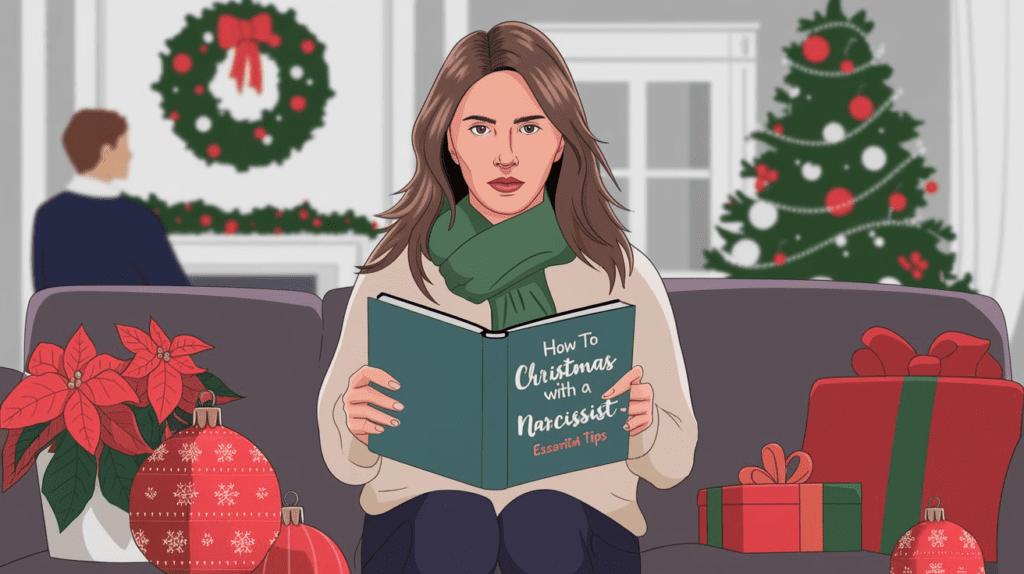- Recognizing Holiday Narcissistic Patterns
- The narcissist’s Christmas playbook
- Predictable sabotage tactics
- Understanding their emotional triggers
- Preparing Your Emotional Toolkit
- Building internal resilience
- Developing coping mechanisms
- Creating emotional safety plans
- Strategic Communication Planning
- Gray rock method during festivities
- Setting firm holiday boundaries
- Managing expectations
- Surviving Family Christmas Events
- Choosing your battles wisely
- Creating physical distance strategies
- Maintaining emotional equilibrium
- Protecting Your Holiday Joy
- Reclaiming Christmas traditions
- Building a support network
- Self-care during difficult times
- Managing Gift-Giving Dynamics
- Setting financial boundaries
- Handling manipulation through gifts
- Protecting yourself from obligation
- Navigating Extended Family Relations
- Managing flying monkeys
- Setting boundaries with enablers
- Maintaining healthy relationships
- Post-Holiday Recovery Planning
- Processing emotional aftermath
- Rebuilding personal boundaries
- Moving forward with healing
- Conclusion
- From Embrace Inner Chaos to your inbox
- Frequently Asked Questions
- How Can I Set Boundaries With A Narcissist During Christmas Gatherings?
- What Are Some Common Narcissistic Behaviors To Watch Out For During The Holidays?
- How Can I Cope With A Narcissistic Parent During Christmas Celebrations?
- What Strategies Can Help Minimize Conflict With A Narcissist During Holiday Events?
- How Do I Handle Gift-Giving Expectations With A Narcissistic Family Member?
- What Self-Care Practices Are Important When Dealing With A Narcissist During The Holidays?
- How Can I Protect My Children From Narcissistic Manipulation During Christmas?
- What Are Some Red Flags Of Narcissistic Abuse During The Holiday Season?
- How Can I Maintain My Mental Health While Dealing With A Narcissistic Partner During Christmas?
- What Strategies Can Help Me Avoid Getting Drawn Into Narcissistic Drama During Family Gatherings?
- How Can I Set Realistic Expectations For Christmas With A Narcissistic Family Member?
- What Are Some Effective Ways To Respond To Narcissistic Guilt-Tripping During The Holidays?
- How Can I Create A Support System To Help Me Cope With A Narcissistic Family Member During Christmas?
- What Are Some Healthy Ways To Cope With The Emotional Aftermath Of Christmas With A Narcissist?
- How Can I Maintain My Own Holiday Traditions While Dealing With A Narcissistic Family Member?
- What Strategies Can Help Me Avoid Falling Into The Narcissist’s Manipulation Tactics During Christmas Gatherings?
- How Can I Handle A Narcissist’s Attempts To Dominate Or Control Holiday Plans?
- What Are Some Effective Ways To Disengage From A Narcissist’s Drama During Holiday Events?
- How Can I Protect My Self-Esteem From A Narcissist’s Criticism During Christmas Celebrations?
- What Coping Mechanisms Can Help Me Deal With The Stress Of Spending Christmas With A Narcissist?
While most people count down to Christmas with excitement, those of us dealing with a narcissist often watch the calendar with growing dread. The narcissist and Christmas create a particularly challenging combination that can turn what should be a joyful celebration into an emotional minefield.
We’ve all experienced how narcissists ruin holidays – whether through attention-seeking behavior, emotional manipulation, or creating unnecessary drama. What makes Christmas especially difficult is its emphasis on family togetherness and traditions, providing numerous opportunities for narcissistic behavior to surface.
If you’re unsure whether you’re dealing with a narcissist, it’s helpful to familiarize yourself with 18 signs you’re dealing with a narcissist or signs you are dealing with a narcissist. They struggle with holidays because the focus on family reminds them of their inability to form real connections. Understanding how narcissists behave during Christmas can help you spot manipulation and prepare for challenges.
In this comprehensive guide, we’ll share practical strategies to help you navigate the holiday season while protecting your mental well-being. From setting boundaries to managing gift-giving dynamics, we’ll cover everything you need to know about surviving Christmas with a narcissist in your life. Discover essential tips and coping strategies on how to survive Christmas with a narcissist and enjoy a stress-free season.
Recognizing Holiday Narcissistic Patterns
Let’s dive into the telltale signs that help us spot a narcissist’s holiday behavior patterns. I’ve observed that understanding these patterns is our first line of defense in protecting our peace during the festive season.
The narcissist’s Christmas playbook
We’ve all witnessed how narcissists follow a predictable script during Christmas. They often start their holiday manipulation as early as autumn, when the first decorations appear. I’ve noticed they typically begin by creating chaos around holiday planning and family gatherings. Their primary goal? Making sure they remain the center of attention when everyone else is focused on family togetherness.
• Key warning signs to watch for:
- Excessive criticism of holiday preparations
- Sudden emotional outbursts or mood swings
- Attempts to control holiday plans
- Competing for attention with children or other family members
Predictable sabotage tactics
In my experience working with families, narcissists use specific tactics to disrupt holiday celebrations. They often weaponize gift-giving in countless ways. We see them buying excessive presents as manipulation tools or giving intentionally thoughtless gifts to hurt feelings.
What’s particularly striking is how they time their disruptions. They’ll frequently start fights right before important celebrations or create drama during key family moments. I’ve noticed they’re especially fond of using the silent treatment during the holiday season, knowing it causes maximum emotional impact.
Understanding their emotional triggers
Christmas brings out the worst in narcissists because it threatens them on multiple levels. We need to understand that they struggle with holidays for specific reasons. The season’s focus on family bonding and genuine connection reminds them of their inability to form authentic relationships.
What really sets them off is seeing others receive attention and appreciation. Think about it – Christmas naturally shifts focus to children’s joy, family traditions, and shared experiences. For a narcissist, this feels like a personal attack on their need to be the constant center of attention.
I’ve observed that they often respond to these triggers in two ways: either by trying to dominate all holiday activities or by completely sabotaging them. They might criticize everything from decorations to dinner preparations, or suddenly become depressed and demand everyone’s attention shifts to their emotional state.
Understanding these patterns helps us recognize when we’re being manipulated. By identifying these behaviors early, we can better prepare ourselves for the emotional challenges ahead and maintain our holiday spirit despite their attempts to diminish it.


Preparing Your Emotional Toolkit
Having spent years helping others deal with narcissists during the holidays, I’ve learned that preparing our emotional toolkit is crucial for survival. Let’s build that toolkit together.
Building internal resilience
I’ve found that holiday stress with narcissists requires special preparation. Research shows that the holiday season can be particularly triggering for those dealing with narcissistic abuse. We need to start by acknowledging that it’s okay to feel overwhelmed – this validation is our first step toward building resilience.
One of the most powerful tools I recommend is what I call “radical self-compassion.” This means giving ourselves permission to celebrate differently, even if it means breaking from traditional expectations. Remember, we’re not obligated to maintain exhausting traditions that drain our emotional energy. If you’re unsure whether you’ve experienced narcissistic abuse, consider reviewing these 21 signs you’ve experienced narcissistic abuse or 21 red flags of narcissistic abuse.
Developing coping mechanisms
In my experience, successful coping mechanisms need to be both practical and immediately accessible. Here are the strategies I’ve seen work consistently:
- Create a “holiday pause button” – step outside for fresh air when tensions rise
- Develop a code word with trusted friends or family for quick support
- Practice the “gray rock” method during difficult interactions
- Set firm time limits for gatherings
The key is preparation, not perfection. I always remind my clients that it’s okay if some coping strategies don’t work perfectly – we’re building a toolkit, not seeking a single solution.
Creating emotional safety plans
I’ve learned that emotional safety plans are as crucial as physical ones during holiday gatherings. Start by identifying your triggers and warning signs – does your heart race? Does your face flush? These physical cues can be your early warning system.
We need to create what I call “peace pockets” – designated safe spaces or activities we can turn to when we feel overwhelmed. This might mean:
Physical Safety Measures:
- Having your own transportation to leave if needed
- Identifying a quiet space for brief retreats
- Keeping a supportive friend on standby
Emotional Boundaries:
- Planning specific time limits for visits
- Preparing neutral conversation topics
- Setting clear financial boundaries for gift-giving
Remember, we’re not being dramatic by preparing these safety measures – we’re being smart and proactive. Research shows that having a solid emotional safety plan can significantly reduce holiday stress and help maintain our emotional equilibrium.


Strategic Communication Planning
I’ve discovered that strategic communication is our strongest defense when dealing with narcissists during Christmas. After years of experience, I can tell you that having a solid plan makes all the difference between surviving and thriving during holiday gatherings.
Gray rock method during festivities
One of the most effective techniques I recommend is the gray rock method – making yourself as uninteresting as a gray rock to avoid narcissistic manipulation. Here’s how we can implement this during holiday gatherings:
- Give one-word answers when possible
- Avoid sharing personal information or emotions
- Stay neutral on controversial topics
- Redirect conversations to mundane subjects
- Maintain a calm, uninteresting demeanor
I’ve found this method particularly powerful because narcissists thrive on emotional reactions and drama. When we become “boring,” they often lose interest and seek attention elsewhere. For more insights on how narcissists manipulate, check out these 7 subtle signs you’re being manipulated or 19 hidden signs of narcissistic abuse.
Setting firm holiday boundaries
In my experience, holidays require extra-strong boundaries because narcissists tend to push harder during festive occasions. I always tell my clients that it’s crucial to set clear limits without announcing them to the narcissist. We need to remember that we have the freedom to come and go, speak or not speak – our presence at family holidays is a gift, not an obligation.
I recommend having several emergency exits ready, such as “I need to help in the kitchen” or “I’m going to play with the kids”. These provide us with graceful ways to step away when situations become overwhelming.
Managing expectations
Here’s something crucial I’ve learned: having realistic expectations is half the battle when dealing with narcissists during Christmas. We need to accept that if we have a narcissistic family member, the holidays won’t be perfect.
I always emphasize to my clients that we shouldn’t expect empathy or deep concern from narcissists – they simply don’t have that capacity. Instead, we should focus on what we can control: our responses and reactions. When they try to provoke us, we can choose to redirect conversations to neutral topics like their favorite TV shows or sports teams.
Remember, we’re not being unfair or unkind by protecting ourselves. If someone belittles our gifts or accomplishments, we can remain non-reactive while reminding ourselves that their attacks aren’t personal – they’re about their need for control. Understanding 18 ways narcissists make you feel bad about yourself can help you recognize and counter these tactics.
Surviving Family Christmas Events
Family gatherings during Christmas can feel like walking through an emotional minefield when a narcissist is involved. I’ve learned through experience that survival requires a combination of strategy, distance, and emotional control. It’s crucial to be aware of the hidden dangers of loving a covert narcissist and the 31 subtle signs of covert narcissism you may have missed.
Choosing your battles wisely
When dealing with narcissists during holiday events, I always remind myself that not every provocation requires a response. The truth is, narcissists often spiral during the holidays because festive cheer threatens them. I’ve found that staying calm and focused while using brief, neutral responses like “noted” helps maintain peace during family gatherings.
Creating physical distance strategies
Physical distance isn’t just about space – it’s about creating safety zones. Here are my tried-and-tested strategies for maintaining healthy separation:
- Have your own transportation to maintain control over when you leave
- Create scheduled breaks throughout the event
- Use the bathroom as a temporary sanctuary when needed
- Set a specific time limit for how long you’ll stay
- Position yourself near supportive family members
I’ve discovered that having an exit strategy is crucial. Remember, you don’t have to attend the entire gathering – it’s perfectly acceptable to leave early if needed. Sometimes, splitting hotel costs to maintain your sanity is worth every penny.


Maintaining emotional equilibrium
Keeping our emotional balance requires preparation and practice. I’ve learned that the bathroom can become our temporary “sanity getaway room” when we feel overwhelmed. When I feel my anxiety rising, I use deep breathing exercises to stay grounded.
One powerful technique I’ve adopted is viewing the narcissist’s behavior differently. Instead of taking their actions personally, I try to see them as someone stuck at an emotional age of five – it helps maintain perspective. This shift in viewpoint allows us to respond with composure rather than reaction.
Remember this crucial truth: everything is temporary, including holiday gatherings. When tensions rise, I silently repeat this mantra to myself. It’s essential to understand that we can’t change the narcissist’s behavior, but we absolutely can control our responses.
I always emphasize to my clients that having a trusted ally at family gatherings makes a significant difference. This person can help divert conversations and provide emotional support when needed. Together, you can create a buffer against the narcissist’s attempts to dominate or manipulate the gathering.
By focusing on positive interactions with supportive family members and maintaining clear boundaries, we can protect our holiday spirit. The key is remembering that we have choices – in how long we stay, who we interact with, and how we respond to provocations.
Protecting Your Holiday Joy
The holidays don’t have to be a season of dread, even with a narcissist in our lives. Recent studies show that 89% of adults feel stressed during the holiday season, but I’ve discovered that we can reclaim our joy with the right approach and mindset.
Reclaiming Christmas traditions


I’ve learned that creating new traditions can be incredibly healing. Instead of clinging to old patterns that may trigger painful memories, we can build fresh celebrations that truly reflect our values. For instance, I encourage my clients to start what I call “joy rituals” – activities that bring genuine happiness without depending on the narcissist’s participation.
Remember this empowering truth: We have the right to celebrate in ways that feel authentic to us. Whether it’s starting a new gift-giving tradition or creating different celebration times, we can shape our holiday experience. I’ve seen how making these changes helps us break free from the narcissist’s influence over our festivities.
Building a support network
Having a strong support system is crucial during the holiday season. I always emphasize that we don’t have to face these challenges alone. Research shows that connecting with understanding friends or support groups can significantly reduce holiday stress.
Here’s how I recommend building your holiday support network:
- Identify trusted friends who understand narcissistic dynamics
- Connect with support groups or online communities
- Schedule regular check-ins with a therapist or counselor
- Plan alternative celebrations with supportive people
- Create a list of emergency contacts for emotional support
Self-care during difficult times
Taking care of ourselves becomes even more critical during the holiday season. I’ve noticed that many of us forget self-care when dealing with narcissistic family members, but it’s exactly what we need most. Studies indicate that 41% of adults report higher stress levels during holidays compared to other times.
My essential self-care strategy includes what I call “peace pockets” – designated times and spaces for recharging. This might mean taking a quiet walk, reading a favorite book, or practicing meditation. I’ve found that maintaining regular exercise and rest patterns helps immensely in staying grounded.
One powerful approach I’ve developed is the “joy inventory” practice. Each day, I encourage noting at least one moment of genuine happiness, no matter how small. This helps us stay connected to positive experiences even when dealing with holiday stress. Remember, finding joy isn’t selfish – it’s necessary for our emotional survival.
For those struggling with loss or separation during the holidays, I recommend being gentle with ourselves. It’s okay to feel mixed emotions or to celebrate differently this year. The key is creating meaningful moments that honor our needs while maintaining healthy boundaries with the narcissist in our life. For more guidance on self-care after narcissistic abuse, explore these trauma-informed self-care techniques.


Managing Gift-Giving Dynamics
Gift-giving with narcissists during Christmas often feels like walking through a field of emotional landmines. I’ve seen how what should be joyful exchanges become weapons of manipulation and control. Let’s explore how to handle these challenging dynamics while protecting our emotional and financial well-being.
Setting financial boundaries
I’ve learned that establishing clear financial limits before the holiday season is crucial. Research shows that narcissists often request gifts far beyond reasonable price ranges, using our refusal as “proof” of insufficient love or care. To counter this, I recommend creating what I call a “gift budget fortress” – a set of non-negotiable financial boundaries.
Here’s my proven approach to maintaining financial sanity:
- Set a strict spending limit and stick to it regardless of pressure
- Keep separate finances if possible to prevent manipulation
- Consider group gifts instead of individual presents
- Document all gift-related expenses to maintain clarity
Handling manipulation through gifts
Through years of experience, I’ve observed how narcissists turn gift-giving into a power play. They often leave price tags visible on expensive presents, not for returns but to create a sense of obligation. I’ve noticed they use gifts as emotional currency, expecting endless returns on their “investment.”
The manipulation typically shows up in these ways:
- Expensive gifts with visible price tags to create indebtedness
- Public gift-giving to craft a generous image
- Inappropriate or thoughtless gifts meant to hurt
- Using past gifts as ammunition in arguments
Research confirms that narcissists give presents to maintain control in relationships, not to bring joy. I’ve found that understanding this motivation helps us avoid falling into their emotional traps.


Protecting yourself from obligation
I always emphasize that gifts from narcissists come with strings attached – they’re rarely simple expressions of love or care. Studies show that elaborate gifts often precede major requests or manipulative behavior.
To protect ourselves, I recommend what I call the “gift neutralization strategy”:
- Acknowledge gifts simply without excessive gratitude
- Avoid accepting extravagant presents that create obligation
- Keep gift receipts and maintain the option to return items
- Set clear expectations about reciprocation
Remember, narcissists often use holiday gifts as future ammunition, bringing up past generosity during arguments or public gatherings. I’ve found that maintaining emotional distance from their gifts helps prevent this manipulation from taking root.
When dealing with narcissistic gift-giving, I always remind myself that their presents reflect their needs, not our worth. By understanding this dynamic, we can participate in holiday gift exchanges while protecting our emotional and financial boundaries.
Navigating Extended Family Relations
Dealing with extended family during Christmas brings unique challenges, especially when they’ve become entangled in the narcissist’s web of manipulation. I’ve seen how holiday gatherings can turn into emotional battlegrounds when family members take sides. It’s crucial to understand the cycle of abuse in your narcissistic relationship and how to recognize and escape the narcissistic abuse cycle.
Managing flying monkeys
In my experience, narcissists rarely act alone during the holidays – they recruit others to do their bidding. These “flying monkeys” often believe they’re helping maintain family peace, but they’re actually enabling harmful behavior. I’ve found that the most effective approach is staying calm and neutral when they try to intervene.
Research shows that some flying monkeys are victims themselves, trapped by the narcissist’s false narratives. I’ve learned to respond with what I call “compassionate detachment” – being kind while maintaining firm boundaries. When they relay messages or try to mediate, I simply say, “Thanks for sharing” or “I’ll think about that” without engaging further.
Setting boundaries with enablers
Through years of working with families, I’ve observed that enablers follow clear patterns during holiday gatherings. They’re constantly working to keep peace with the narcissist, often at others’ expense.
Here are the key enabler behaviors I’ve identified:
- Hyper-awareness of the narcissist’s needs
- Excessive peacekeeping attempts
- Turning to others to fix the narcissist’s issues
- Defending inappropriate behavior
- Making excuses for holiday disruptions
I recommend creating what I call “internal boundaries” before any interaction. This means:
- Planning arrival and departure times
- Setting stress tolerance limits (0-10 scale)
- Preparing neutral responses to criticism
- Identifying specific triggers
- Having ready excuses to step away
Maintaining healthy relationships
Despite these challenges, I’ve discovered we can preserve connections with supportive family members. The key is being selective about our interactions. Research indicates that having witnesses present during interactions with enablers can help prevent fact-twisting later.
I’ve found success with what I call the selective engagement strategy. This means maintaining relationships with family members who respect boundaries while limiting exposure to those who enable toxic behavior. During holiday gatherings, I focus my energy on positive interactions and meaningful conversations with supportive relatives.
Remember this crucial point: We don’t need to subject ourselves, our partners, or our children to enabling behavior. I always remind myself that it’s okay to have different levels of engagement with different family members. Some relationships might sustain a few hours at a holiday party, while others require more distance.
When dealing with extended family during Christmas, I’ve learned that clarity about our values is essential. We can choose how we’ll act when holidays arrive. This might mean shorter visits, separate celebrations, or creating new traditions with those who truly support our well-being.
Through experience, I’ve discovered that maintaining healthy relationships often requires what I call “selective transparency” – sharing different levels of information with different family members based on their ability to respect boundaries and maintain confidentiality. This approach helps protect our peace while preserving meaningful connections during the holiday season.
Post-Holiday Recovery Planning
After the holiday storm with a narcissist subsides, I’ve found that intentional recovery becomes our lifeline. Through years of helping survivors heal, I’ve learned that the post-holiday period requires as much care and attention as the celebration itself. It’s essential to understand the psychological impact of narcissistic abuse and its long-term effects.
Processing emotional aftermath
The days following Christmas often bring a mix of relief and exhaustion. I’ve observed that it’s natural to feel defensive when processing a narcissist’s holiday manipulation. What helps most is acknowledging these feelings without judgment. When clients come to me feeling drained, I remind them that their emotions are valid responses to challenging situations.
I recommend what I call the “emotional inventory technique” to process holiday experiences:
- Journal specific incidents that triggered stress
- Document successful boundary moments
- Note lessons learned for future interactions
- Identify support system members who helped
- Record personal victories, no matter how small
Rebuilding personal boundaries
After holiday gatherings, I’ve noticed how boundaries often need reinforcement. Research shows that we can’t control the narcissist, but we can protect and empower ourselves with safer boundaries. This insight guides my approach to post-holiday recovery.
Here’s my proven process for boundary reconstruction:
- Assess which boundaries held firm during holidays
- Identify where boundaries need strengthening
- Document specific boundary violations for future reference
- Create new strategies for maintaining limits
- Practice boundary-reinforcing statements


Moving forward with healing
I’ve discovered that healing requires active engagement in our recovery process. After navigating difficult interactions, I encourage what I call “reset activities” – practices that help us decompress and reinforce the boundaries we’ve set.
Creating Your Healing Path: The journey forward often requires professional support. I’ve seen how talking to a mental health professional who understands narcissistic behavior can provide personalized strategies for managing even the most volatile situations. This support becomes crucial in processing the strong emotions that surface during recovery.
When working with survivors, I emphasize the importance of grounding techniques to stay connected to the present moment. These simple practices help lighten the emotional burden, especially when the weight feels overwhelming.
Remember, narcissistic abuse and feelings of sadness thrive in isolation. I always encourage reaching out to others who understand our experience. This connection helps us feel seen and heard, creating a foundation for lasting healing. For a comprehensive approach to healing, consider exploring this step-by-step recovery guide for healing from narcissistic abuse or this comprehensive guide to healing after narcissistic abuse.
Practical Recovery Steps: In my practice, I’ve found that creating new traditions becomes a powerful step toward healing and autonomy. This might mean:
- Establishing different celebration patterns
- Creating personal rituals that bring joy
- Building new memories without the narcissist’s influence
I’ve learned that the holiday season can intensify grief – not just over what we’ve lost, but also over the continued manipulation and control we’ve experienced. That’s why I recommend taking time to reflect on our needs and allowing ourselves space to feel without guilt.
Through years of supporting recovery, I’ve observed that healing isn’t linear. Some days feel easier than others, and that’s perfectly normal. What matters most is maintaining our commitment to self-compassion and growth. As I often tell my clients, this period of recovery is an opportunity for self-reflection and renewed strength. For those looking to reclaim their sense of self after narcissistic abuse, this guide on surviving narcissistic abuse and reclaiming your sense of self can be incredibly helpful.
Conclusion
Surviving Christmas with a narcissist demands strength, strategy, and self-compassion. Through my years of experience, I’ve seen how understanding narcissistic patterns, setting firm boundaries, and maintaining emotional distance helps protect our holiday joy. While perfect celebrations might remain elusive, we can create meaningful experiences by focusing on what we can control.
Remember that each small victory counts – whether declining an manipulative gift, maintaining gray rock responses, or stepping away when needed. These actions build our resilience and protect our well-being during future holiday seasons.
Most importantly, we must acknowledge that choosing our peace over pleasing a narcissist isn’t selfish – it’s essential for our emotional survival. Armed with the strategies we’ve discussed, we can face future holidays with confidence, knowing we have the tools to protect ourselves while still finding moments of genuine joy during the festive season.
For those ready to take the next step in their healing journey, I highly recommend exploring our comprehensive guides on breaking free from narcissistic abuse, empowering yourself against covert narcissistic abuse, and from surviving to thriving: reclaiming joy after narcissistic abuse. These resources provide invaluable insights and practical strategies for reclaiming your life and finding lasting peace.
As you continue on your path to healing, remember that you’re not alone. There are many resources available to help you understand and overcome the effects of narcissistic abuse, including guides on recognizing the patterns and breaking the cycle of narcissistic abuse in relationships, surviving the most toxic relationship, and recognizing the signs of narcissistic abuse syndrome and getting help.
Your journey from victim to victor is possible, and resources like from victim to victor: overcoming the effects of narcissistic abuse can guide you along the way. Remember, healing is about reclaiming your identity: life after narcissistic abuse and rebuilding your self-esteem after narcissistic devaluation.
As you navigate this holiday season and beyond, keep in mind that your healing journey is unique. Whether you’re just starting to recognize the 21 subtle early signs of narcissistic abuse or you’re well on your way to reclaiming your authentic self, each step forward is a victory. Your path to healing and self-discovery is valid, and with time, patience, and the right support, you can create a life filled with genuine joy and authentic connections.


From Embrace Inner Chaos to your inbox
Transform your Chaos into authentic personal growth – sign up for our free weekly newsletter! Stay informed on the latest research advancements covering:
Narcissistic Personality Disorder (NPD)
Frequently Asked Questions
How Can I Set Boundaries With A Narcissist During Christmas Gatherings?
Setting boundaries with a narcissist during Christmas gatherings is crucial for your mental well-being. Start by clearly communicating your limits and expectations before the event. Be firm and consistent in enforcing these boundaries, even if the narcissist tries to push back. Remember, it’s okay to say “no” to unreasonable demands or to leave early if you feel overwhelmed.
Out of the FOG suggests using the “broken record” technique – calmly repeating your stance without engaging in arguments. If the narcissist becomes aggressive or manipulative, have a pre-planned exit strategy. Setting boundaries may feel uncomfortable at first, but it’s essential for protecting your emotional health during the holiday season.
What Are Some Common Narcissistic Behaviors To Watch Out For During The Holidays?
Narcissists often exhibit heightened manipulative behaviors during the holidays due to increased opportunities for attention and control. Watch out for excessive gift-giving or withholding gifts as a form of manipulation. They may also try to dominate holiday planning, insisting on having things their way or creating drama if their demands aren’t met.
Narcissistic Abuse Support warns about holiday gaslighting, where the narcissist may try to rewrite family history or deny past abusive behaviors. Be aware of attempts to triangulate family members against each other or to use guilt-tripping to control your actions. Recognizing these behaviors can help you maintain your emotional balance and respond appropriately.
How Can I Cope With A Narcissistic Parent During Christmas Celebrations?
Dealing with a narcissistic parent during Christmas can be particularly challenging. Establish clear boundaries and limit your exposure if possible. Plan shorter visits or consider alternative ways to celebrate that don’t involve direct interaction. Remember, it’s okay to prioritize your well-being over meeting unrealistic expectations.
Surviving Narcissism advises developing a support system of friends or other family members who understand your situation. Share your concerns and plans with them beforehand. Practice self-care techniques like meditation or deep breathing to manage stress during interactions. If things become too overwhelming, give yourself permission to leave early or skip certain events altogether.


What Strategies Can Help Minimize Conflict With A Narcissist During Holiday Events?
Minimizing conflict with a narcissist during holiday events requires careful planning and emotional management. One effective strategy is to avoid engaging in arguments or trying to prove them wrong. Instead, use neutral responses and change the subject when contentious topics arise. The National Domestic Violence Hotline recommends the “grey rock” method, where you remain as uninteresting and non-reactive as possible to avoid feeding into their need for drama.
Another helpful approach is to have a predetermined time limit for your interactions. Let the narcissist know in advance how long you plan to stay, and stick to your schedule. This can help reduce the opportunity for conflict and give you a clear exit strategy. Additionally, try to keep conversations light and avoid sharing personal information that could be used against you later.
How Do I Handle Gift-Giving Expectations With A Narcissistic Family Member?
Gift-giving with a narcissistic family member can be a minefield of expectations and potential disappointment. To navigate this, set clear boundaries around gift exchanges. Consider suggesting a gift limit or organizing a Secret Santa to reduce pressure. Remember, no gift will ever be “good enough” for a true narcissist, so manage your own expectations accordingly.
Psych Central advises against trying to win a narcissist’s approval through extravagant gifts. Instead, give thoughtful but modest presents. Be prepared for potential criticism or comparisons, and have a neutral response ready. If the narcissist gives inappropriate or hurtful gifts, remember it’s a reflection of their issues, not your worth.
What Self-Care Practices Are Important When Dealing With A Narcissist During The Holidays?
Self-care is crucial when dealing with a narcissist during the holidays. Prioritize activities that replenish your emotional energy. This might include regular exercise, meditation, or engaging in hobbies you enjoy. Healthline emphasizes the importance of maintaining your normal routines as much as possible to provide a sense of stability.
Make time for supportive relationships outside of the narcissistic dynamic. Plan debriefing sessions with a trusted friend or therapist after difficult interactions. Practice mindfulness techniques to stay grounded in the present moment rather than getting caught up in the narcissist’s drama. Remember, it’s okay to take breaks and step away from stressful situations to recharge.
How Can I Protect My Children From Narcissistic Manipulation During Christmas?
Protecting children from narcissistic manipulation during Christmas requires vigilance and open communication. Prepare your children by having age-appropriate discussions about healthy relationships and boundaries. Parenting for Brain suggests role-playing potential scenarios to help children practice responding to manipulative behavior.
Limit unsupervised time between the narcissist and your children. Be present during gift exchanges to mediate any potential issues. After interactions, debrief with your children, validating their feelings and experiences. Emphasize that any hurtful behavior from the narcissist is not their fault. Create new, positive holiday traditions with your children to counterbalance any negative experiences.
What Are Some Red Flags Of Narcissistic Abuse During The Holiday Season?
Recognizing red flags of narcissistic abuse during the holidays is crucial for protecting yourself. Watch for attempts to isolate you from other family members or friends, often under the guise of “quality time.” Be wary of excessive criticism, especially about your appearance or contributions to holiday preparations. Abuse Defined warns about love bombing – sudden displays of affection or generosity designed to manipulate you.
Pay attention to gaslighting behaviors, where the narcissist denies or twists past events to make you doubt your memory. Be cautious of attempts to control your schedule or dictate how you should spend the holidays. If you find yourself constantly walking on eggshells or feeling emotionally drained after interactions, these could be signs of ongoing narcissistic abuse.
How Can I Maintain My Mental Health While Dealing With A Narcissistic Partner During Christmas?
Maintaining your mental health while dealing with a narcissistic partner during Christmas requires a strong focus on self-care and boundary-setting. Choosing Therapy recommends creating a support network of friends, family, or a therapist who can provide emotional validation and perspective. Regularly check in with yourself about your feelings and needs.
Establish clear boundaries about holiday activities and stick to them. Don’t be afraid to say no to events or traditions that cause you stress. Practice mindfulness techniques to stay grounded in the present moment rather than getting caught up in your partner’s drama. Consider individual therapy to work through the emotional challenges of being in a relationship with a narcissist.
What Strategies Can Help Me Avoid Getting Drawn Into Narcissistic Drama During Family Gatherings?
Avoiding narcissistic drama during family gatherings requires a combination of preparation and in-the-moment strategies. Before the event, set clear intentions for how you want to behave and what you’re willing to engage in. Psychology Today suggests using the “gray rock” method, where you make yourself as uninteresting as possible to the narcissist by giving short, non-committal responses.
During the gathering, stay busy with tasks or conversations with other family members. Have a few neutral topics prepared to redirect conversations away from contentious subjects. If you find yourself getting drawn into drama, excuse yourself to take a break or help with something in another room. Remember, you’re not responsible for managing the narcissist’s emotions or behavior.
How Can I Set Realistic Expectations For Christmas With A Narcissistic Family Member?
Setting realistic expectations for Christmas with a narcissistic family member is crucial for your emotional well-being. Start by acknowledging that the narcissist’s behavior is unlikely to change significantly, even during the holidays. Narcissist Abuse Support advises focusing on what you can control – your own actions and responses – rather than hoping for a perfect family gathering.
Lower your expectations for meaningful connections or heartfelt moments with the narcissist. Instead, set small, achievable goals for the interaction, such as maintaining your composure or sticking to your boundaries. Plan for self-care activities before and after the event to help you process your emotions. Remember, it’s okay if the holidays aren’t perfect – your well-being is more important than meeting unrealistic standards.
What Are Some Effective Ways To Respond To Narcissistic Guilt-Tripping During The Holidays?
Responding to narcissistic guilt-tripping during the holidays requires a firm stance and emotional detachment. Recognize that guilt-tripping is a manipulation tactic designed to control your behavior. Psych Central recommends using “I” statements to assert your feelings and decisions without attacking the narcissist. For example, “I’ve decided to spend Christmas Eve with my friends this year.”
Practice phrases that acknowledge their feelings without accepting blame, such as “I understand you’re disappointed, but this is what works best for me.” Remember that you’re not responsible for the narcissist’s emotions. If guilt-tripping escalates, it’s okay to end the conversation or leave the situation. Seek support from trusted friends or a therapist to help reinforce your right to make your own choices.
How Can I Create A Support System To Help Me Cope With A Narcissistic Family Member During Christmas?
Creating a support system to cope with a narcissistic family member during Christmas is essential for your emotional resilience. Start by identifying trusted friends, family members, or a therapist who understand your situation. Healthline suggests sharing your concerns and plans with them before the holiday events. Consider asking a supportive person to be on standby for phone calls or texts if you need to vent or seek advice during family gatherings.
Join support groups, either online or in-person, for people dealing with narcissistic family members. These groups can provide valuable coping strategies and a sense of community. Plan self-care activities with supportive friends before and after family events to help you recharge. Remember, building a strong support system is an ongoing process that can significantly improve your ability to handle difficult family dynamics.
What Are Some Healthy Ways To Cope With The Emotional Aftermath Of Christmas With A Narcissist?
Coping with the emotional aftermath of Christmas with a narcissist requires intentional self-care and processing. The Mighty recommends journaling as a way to express and understand your feelings without judgment. This can help you identify patterns in the narcissist’s behavior and your responses, aiding in future boundary-setting.
Engage in activities that help you reconnect with yourself and your values. This might include meditation, exercise, or creative pursuits. Reach out to your support system to share your experiences and receive validation. Consider scheduling a session with a therapist to work through any intense emotions or new insights gained from the holiday interactions.
How Can I Maintain My Own Holiday Traditions While Dealing With A Narcissistic Family Member?
Maintaining your own holiday traditions while dealing with a narcissistic family member requires a balance of assertiveness and flexibility. Start by identifying which traditions are most important to you and your immediate family. Choosing Therapy suggests creating new traditions that don’t involve the narcissistic family member, giving you a sense of control and joy during the holiday season.
Communicate your plans clearly and early, setting boundaries around which events you will and won’t attend. Be prepared for potential pushback and have responses ready. Consider alternating years for certain traditions or finding compromises that allow you to honor your preferences while minimizing conflict. Remember, it’s okay to prioritize your own well-being and that of your immediate family over meeting the demands of a narcissistic relative.
What Strategies Can Help Me Avoid Falling Into The Narcissist’s Manipulation Tactics During Christmas Gatherings?
Avoiding the narcissist’s manipulation tactics during Christmas gatherings requires awareness and preparation. Familiarize yourself with common manipulation techniques like gaslighting, love bombing, and triangulation. Surviving Narcissism recommends developing a strong sense of self and your own values to resist being swayed by the narcissist’s attempts to control or manipulate you.
Practice emotional detachment techniques, such as visualizing a protective shield around yourself. When you notice manipulative behavior, take a moment to breathe and center yourself before responding. Have a trusted friend or family member who can provide reality checks if you start doubting yourself. Remember, you have the right to set boundaries and walk away from manipulative situations, even during family gatherings.
How Can I Handle A Narcissist’s Attempts To Dominate Or Control Holiday Plans?
Handling a narcissist’s attempts to dominate or control holiday plans requires a combination of clear communication and firm boundaries. Start by deciding what aspects of the holidays are most important to you and your immediate family. Psychology Today advises communicating your plans early and clearly, leaving no room for misinterpretation.
Be prepared for the narcissist to push back or try to guilt you into changing your plans. Have prepared responses that are polite but firm, such as “Thank you for the invitation, but we’ve already made our plans for this year.” If the narcissist becomes insistent, it’s okay to limit communication or take a break from interactions. Remember, you have the right to celebrate the holidays in a way that brings you joy and peace.
What Are Some Effective Ways To Disengage From A Narcissist’s Drama During Holiday Events?
Disengaging from a narcissist’s drama during holiday events requires a combination of mental preparation and practical strategies. Psych Central recommends using the “gray rock” method, where you make yourself as uninteresting as possible to the narcissist by giving brief, neutral responses. This can help reduce the narcissist’s interest in engaging you in their drama.
Have a few pre-planned excuses ready to remove yourself from tense situations, such as needing to help in the kitchen or make a phone call. Engage in conversations with other family members or focus on holiday activities to keep yourself occupied. If the narcissist tries to draw you into an argument, calmly state that you’re not comfortable discussing that topic and change the subject. Remember, you’re not responsible for managing the narcissist’s emotions or behavior.
How Can I Protect My Self-Esteem From A Narcissist’s Criticism During Christmas Celebrations?
Protecting your self-esteem from a narcissist’s criticism during Christmas celebrations requires inner strength and self-awareness. Healthline suggests developing a strong sense of self-worth that isn’t dependent on the narcissist’s approval. Remind yourself of your positive qualities and accomplishments before interactions with the narcissist.
When faced with criticism, try to recognize it as a reflection of the narcissist’s own insecurities rather than a true assessment of your worth. Practice positive self-talk and affirmations to counteract negative messages. Have a support person you can reach out to for reassurance if your self-esteem takes a hit. Remember, it’s okay to set boundaries around how much criticism you’re willing to tolerate, even from family members during the holidays.
What Coping Mechanisms Can Help Me Deal With The Stress Of Spending Christmas With A Narcissist?
Dealing with the stress of spending Christmas with a narcissist requires a toolkit of coping mechanisms. Very Well Mind recommends practicing mindfulness techniques to stay grounded in the present moment rather than getting caught up in the narcissist’s drama. Deep breathing exercises or short meditation sessions can help reduce anxiety during family gatherings.
Develop a self-care routine that you can maintain even during busy holiday times, such as regular exercise or journaling. Plan breaks or “escape routes” during family events to give yourself time to recharge. Consider using stress-relief tools like stress balls or fidget toys to help manage tension discreetly. Remember to prioritize your mental health and give yourself permission to limit your exposure to stressful situations, even if it means changing traditional holiday plans.


